Going to college is an exciting time and with all the new lifestyle changes that come from moving and starting a new life, many women experience fluctuations in weight during their first few months at school or at some point throughout their college years. The Freshman 15 is obviously the umbrella term used for college weight gain (in any of the four college years) and, of course, everyone’s personal experience is different. Looking back on my college days, there weren’t any resources for women to help us learn how to make healthy choices and create healthy, sustainable habits in college, which is why I’ve dedicated myself to offering these resources through The Strong Movement and our Strong Girl Workshops across the country!
When I travel and speak to college and sorority women, I share with them my personal story with the Freshman 15 and how it actually led to the beginnings of The Strong Movement. For me, I had an unlimited amount of meals on my student card a dining hall on the first floor of my dorm. So, of course, eating a breakfast muffin, drinking lattes and helping myself to pizza and soft serve fro-yo every day in the dining hall led to some pretty unhealthy eating habits, combined with a lack of exercise and a sleeping schedule that was all over the place.
Before going to college, I never had to watch what I ate, especially since I was dancing competitively and exercising over 8 hours a week. I have found that my experience is very similar to many other women that perhaps were very active in high school with sports or had a healthy daily routine before going to college. It’s unfortunate that colleges don’t offer basic nutrition or exercise classes, or at the very least a healthy habits class, to help college girls make the transition. I truly believe that developing healthy habits (both in mind and body) in college will set you up for success as you go through your four years and transition into life in the “real-world” as a new graduate.
So, you’ve got your dorm room décor up, have a hold on your class schedule, maybe you’ve joined a sorority or an organization on campus and now you need help getting this whole healthy eating, working out and healthy lifestyle thing down. Or perhaps, you’re an upperclassman and need some pointers, since now you may be living in an apartment with a kitchen and need help with what to eat and how to develop a healthy daily routine. Wherever you’re at in your college journey, I’ve outlined 5 Healthy Eating Tips to Avoid the “Freshman 15,” (or college weight gain) and develop healthy eating habits.

-
Drink Water + Hydrate
Hydrate, hydrate, hydrate! I can’t say this enough! Drinking water is extremely important and the basis for optimal functioning. Your cells need water to survive and to work efficiently. When you’re dehydrated, your body has to work extra hard to function and perform basic bodily tasks. You want to make sure you’re drinking enough water, so that you can think properly in class and while you’re doing homework and studying! Dehydration can negatively affect your mood, attention and memory! It may cause you to move slower and puts you at risk of injury when you exercise. Dehydration may even trick you into thinking you’re hungry, when, in fact, you could just use a couple sips of water to keep you going.

So how much water do you need? I recommend at least 3L of water a day, especially if you are working out, sweating or live in a hot climate. We have an entire section devoted to water in the Strong Girl Nutrition Guide, if you want to learn more! The easiest way to remind yourself to drink water is to buy a water bottle and take it with you to class. The point is to hydrate over the course of the day and not gulp down water a liter at a time (not a good idea). Check your urine to gage how hydrated you are. The lighter the color the better.
-
Portion Control + Macronutrients
Your dining hall or sorority house may be an all-you-can-eat buffet style. I recommend doing a full walk-through before you grab a plate to get an idea of all of the options and help you decide what to eat. If you just start loading food on your plate, you’ll end up with a mound of food or maybe even more than one plate and a smorgasbord of flavors from around the world. Stick to one plate at a time. As you walk through, identify a lean protein source, greens or veggies, healthy complex-carbs and healthy fats.
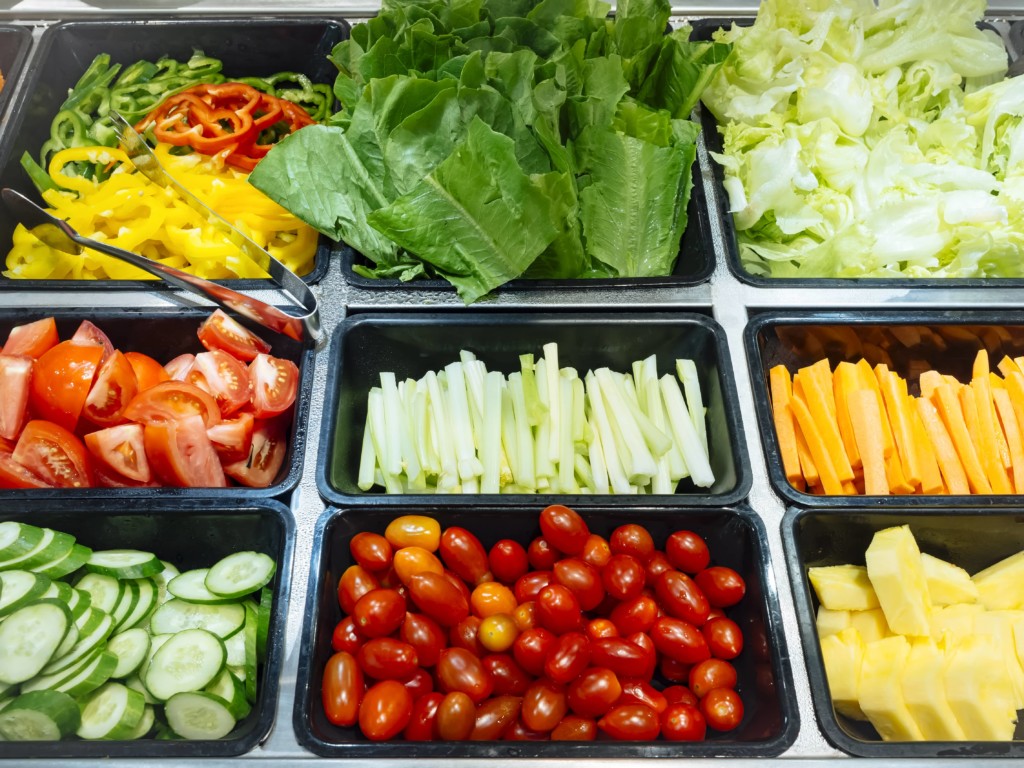
Avoid foods that are fried, breaded or saucy, even though they may look delicious! Sauces, especially creamy ones, pack a lot of unwanted fat into your meal. And breads and pastas have a lot of hidden processed ingredients and added sugars. Many dining halls cater to food allergies and may have a chef on hand that can prepare your food differently. For example, perhaps the chef can grill your chicken with olive oil and steam your veggies instead of just picking the buttery options that are available. Do not be afraid to ask—it’s your body and your health! 🙂

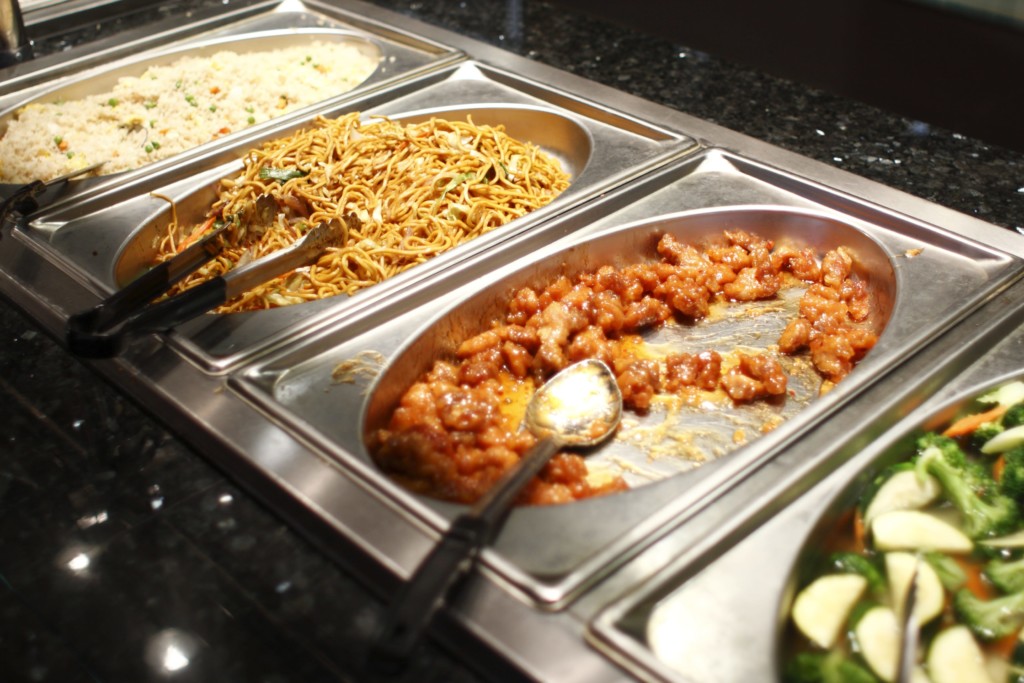
The Strong Girl Nutrition Guide lists out the best and healthiest types of protein, carbs and fats, as well as how much you should have of each, if you want to dive in and really get your nutrition on point. The guide will help you learn to identify which foods to eat and which ones to avoid, especially when there are so many options available in a dining hall!
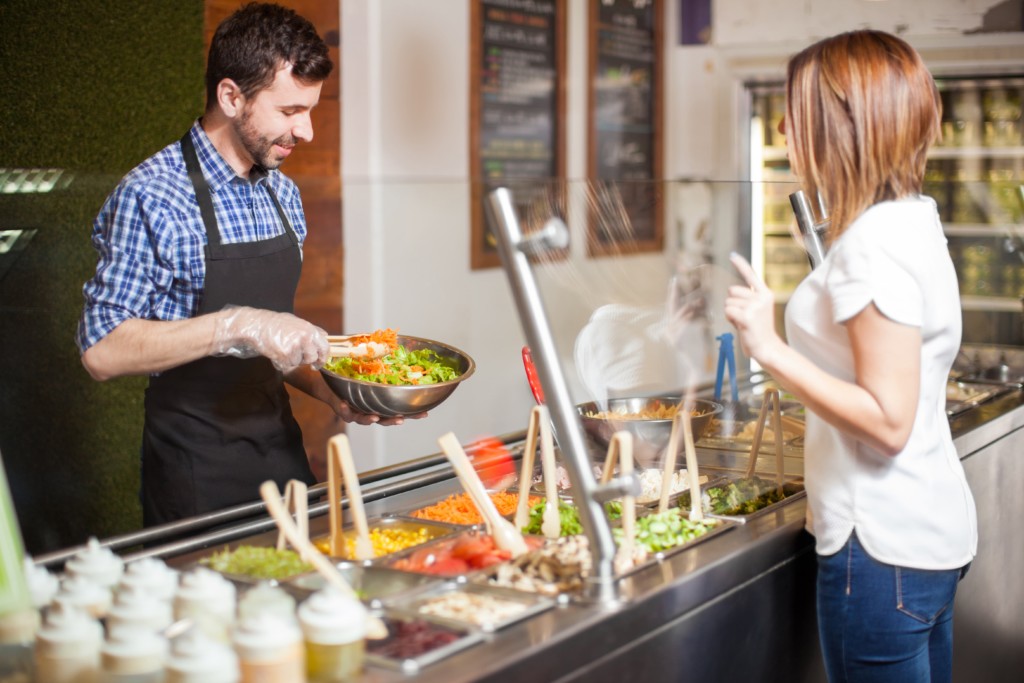
-
Eat 3-5 Meals a Day
Eating throughout the day is key for sustained energy! You want to fuel your brain with brain food, so that you can perform at your best on tests and retain all the new information you’re learning every day. Your brain needs the nutrients from protein, carbs and fats to work at its optimal potential, especially glucose, which comes from carbs. This is why you may realize you crave carbs when you’re studying or intensely concentrating on something.
Skipping breakfast is the worst thing you can do for your metabolism and your brain health! Starting your day off with a balanced, breakfast is key to fueling your brain and body for a day filled with learning! So, if that means getting up earlier before your first class, I highly recommend it.

It’s important to not go too long without food, as well, as it will cause your blood levels to dip and then spike every time you eat. Just like you should drink water throughout the day, you should be eating throughout the day to maintain a level of energy. As you know, it’s hard to function when you’re hungry—or hangry! So, snacking on fruit, nuts, cheese, a protein shake or a light meal can give you the energy you need to get through that mid-morning or mid-afternoon class. When you start to eat more times throughout the day, you’ll realize you won’t need to eat as much at breakfast, lunch or dinner. Eating too much can cause you to be sluggish, lethargic and tired because your body is trying to process all the food you just ate.
I also recommend never going to bed hungry! When you’re hungry, your body is telling you it needs fuel to keep going. And, your brain processes all the information it absorbed and learned throughout the day while you sleep. Your body also recovers and rebuilds during this time, so you want to make sure you’re well-fueled before bed, too! Stay away from processed or sugary foods. A light snack with protein, carbs and fat will slowly digest throughout the night. You won’t wake up starving or hungry for food if you properly fuel before bed.
-
Don’t Be Fooled!
When you go grocery shopping or have all of this food in front of you in the dining hall, it’s hard to know what is and isn’t healthy. Food companies do a great job of tricking you into thinking something is healthy when it isn’t. And, just because something is sold at a health food store and it may be organic, doesn’t mean it’s healthy, either! So, let’s break down the basics.
Learning to read labels and understand the ingredients inside what you’re buying is crucial. If you are buying packaged food, look at the ingredients—the less the better. If there is something that’s hard to pronounce, it’s probably processed or fortified with something. Look at the calorie count of what you’re buying and the ratio between protein, carbs and fats. High carbs could mean high sugar. The same with high fat—it can mean saturated fat. I recommend to really only reach for packaged foods in an emergency, but I understand it’s hard to have fresh, raw food when you live in a dorm, don’t have access to a kitchen or are in between classes, which is why it’s important to learn to understand labels.

Common foods that can be mistaken as healthy, but are packed with empty calories and secret sugar or fat, include yogurts (Chances are your dining hall is not giving you the quality Greek yogurt that is low sugar and high protein, but instead a high sugar yogurt like Yoplait. There’s only one way to know and that’s to ask!), granola, protein bars, flavored oatmeal, cereal, creamy soup, peanut butter, salad dressing, lunch meats, frozen meals, pre-packaged fruit juices, and bread to name a few.
The Strong Girl Nutrition Guide has a recommended grocery list and a detailed list of what foods to buy and eat and which ones to avoid altogether!
-
Cut the Dessert, Soda + Sugary Energy Drinks

I know the dessert section or the self-serve soft-serve fro-yo can be tempting, especially when your friends have a sweet tooth. But, if you really want to control your weight and complement your efforts in the gym then you need to exhibit some self-control when it comes to dessert. I believe you should enjoy the things that you love, but sometimes they taste so much better and you can enjoy every bite more when it’s limited and you don’t have it every day. In the Strong Girl Nutrition Guide, I share my philosophy on cheat meals, or as I call them, free meals.
The same thing goes for soda and sugary energy drinks. Soda and energy drinks are made with high fructose corn syrup, which you should avoid like the plague! Studies have found that high fructose corn syrup contributes to weight gain, obesity and chronic diseases. And, food companies love to sneak high fructose corn syrup into foods like bread, soup, snacks, cereal, drinks, etc —basically anything they can sneak it into! Studies have found that high fructose corn syrup can reduce the amount of leptin (hormone) and insulin that is circulated in your body. These hormones help you feel full, but because the high fructose corn syrup messes with them, you don’t feel as full as you should feel and it can lead to overeating, weight gain and insulin sensitivity.

I know it can be difficult to monitor everything you eat in college, but in order to develop healthy eating habits, it’s important to start looking at food as fuel and how it can help you be your best both physically and mentally. Once you begin to understand what’s in your food and become aware of how your body responds to different foods, you’ll have greater control over your eating habits. Your perspective should shift from “what can’t I eat,” to “which foods fuel and nourish me the most.” And, when you have a different outlook on food and how it can help you, healthy eating habits are much easier to maintain.
I hope these healthy eating tips gave you a better perspective on how to approach nutrition in college and how it can help you avoid unwanted weight gain. Of course, implementing an exercise program along with healthy eating habits is best for keeping off the Freshman 15. But, if you can begin to develop these habits in the dining halls on campus or in the kitchen in your apartment, you’ll have the knowledge and habits to make healthy choices in and out of college.
Invest in yourself and take control of your nutrition and daily habits with the Strong Girl Nutrition Guide! It has all of the information you need to make healthy choices in college.


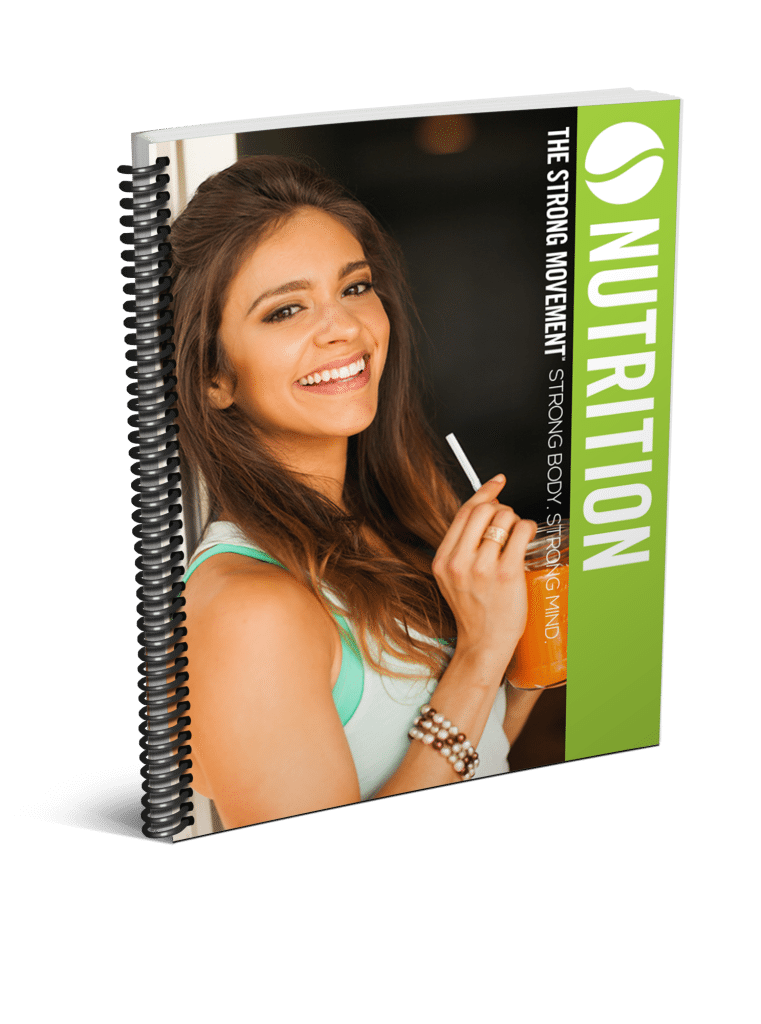
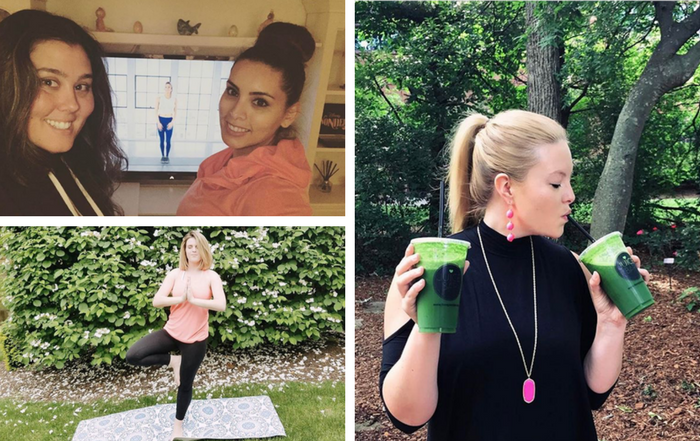


Leave A Comment